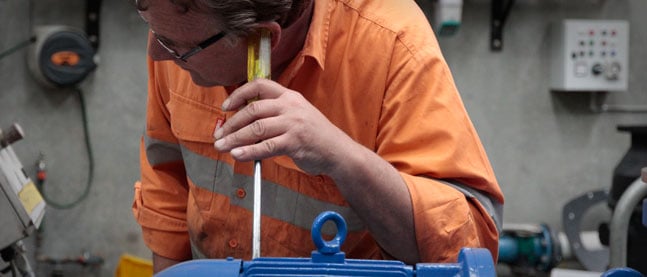
Knowing how your pump sounds when it's running healthy can save you a lot of money in the future. Every pump will make a “healthy” free flowing sound as a medium is passed through it unimpeded. A rhythmic vibration should be produced by the motor. By familiarising yourself with these sounds, you can quickly identify when something is wrong, a change of sound is a a great indicator that there is a problem somewhere. This will allow you to take the correct course of action, and could save you a fortune in future maintenance or replacement costs. Let's take a look at the kind of sounds you might encounter, and talk about the most common culprit – cavitation.
What is Cavitation?
Cavitation is a problem which results in damage to equipment. It occurs during low pressure and can also be found in pump systems with high vacuum conditions. This happens when there is reduced or impeded flow, which is usually a symptom that a pump isn’t working properly or is not suitable for transporting a specific fluid. These changes in pressure result in tiny bubbles within a moving liquid which are small enough to be transported to the discharge side of a pump. There, the pressure increases drastically which causes any bubbles present in the liquid to implode. These implosions produce energy which releases outward shock waves and can cause damage to surrounding surfaces.
The wear and tear caused by cavitation impedes pump performance and will eventually degrade materials so much that components will have to be replaced. This most commonly affects the impeller and there are some great explanations of the physics of cavitation and why this is so common.
What Does it Sound Like?
Cavitation can create a number of sounds. Rather than an occasional rattle, which might be caused by mineral deposits or eroded material from inside a pump system, cavitation sounds like popping bubbles or even rocks passing through the system. This can also be accompanied with a cracking noise and perhaps even a continual rumble. Depending on the type of of pump and its application, your pump should hum, it won't be silent, but if it's doing its job efficiently then it should produce a consistent sound.
How Do I Fix Cavitation?
We'll discuss this in greater detail in a future post, but there are two immediate steps you can take to try to reduce the cavitation taking place:
- Look for Restrictions: Check suction lines for any stuck valve or blocked pipes. Identify if this is happening and remove that issue.
- Move the Pump: Try moving your pump closer to the liquid source. This should help lower the suction head pressure.
If you are having any issues with your pump not performing correctly, please contact the team at Global Pumps who will be able to analyse your system.
Full blog here on what is pump cavitation and how to prevent it.

